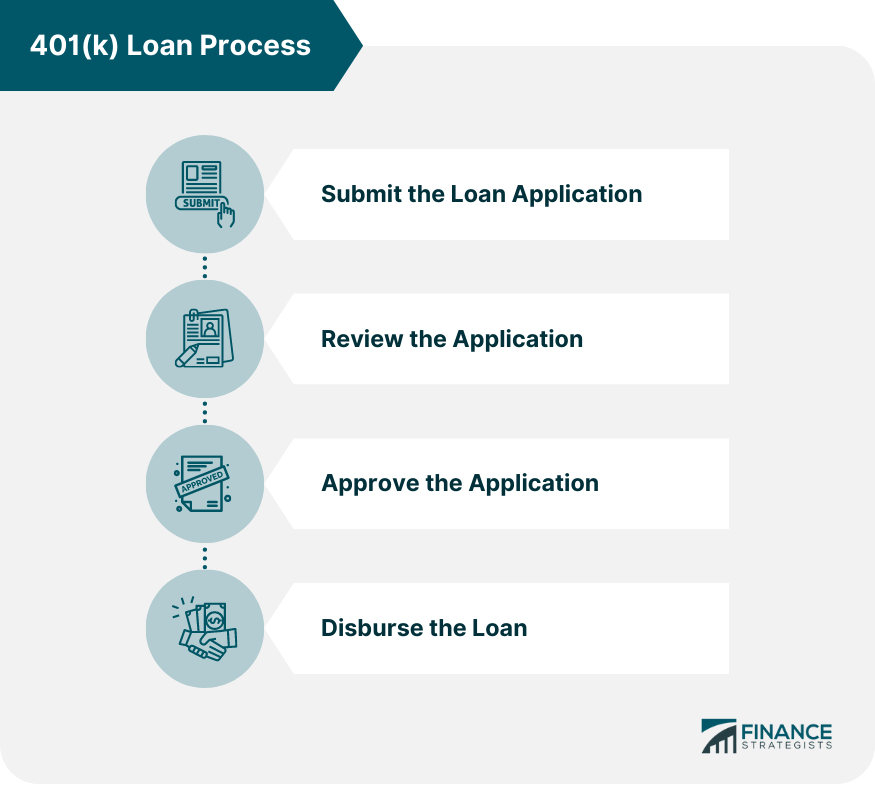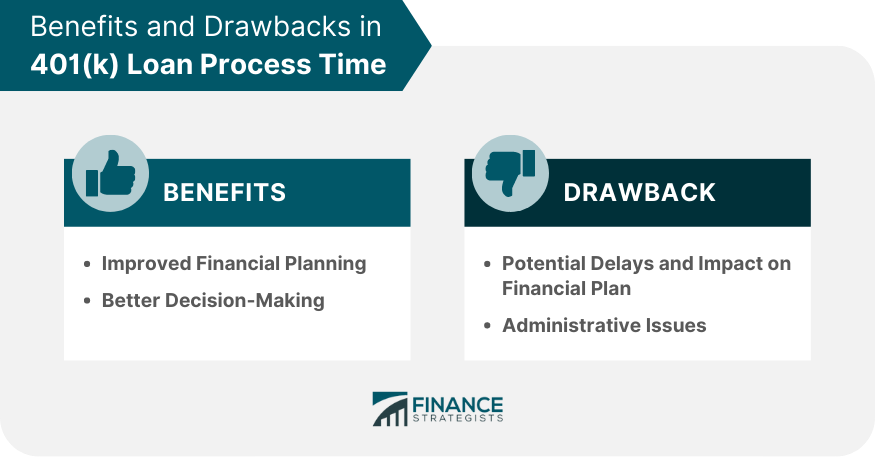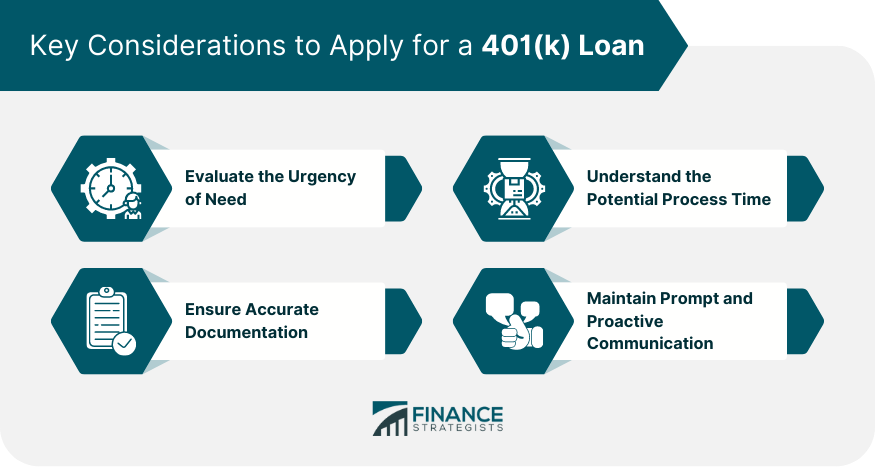The processing time for a 401(k) loan typically ranges between one to two weeks. However, this timeline is not fixed and can vary based on the specific procedures of your plan administrator and the completeness and accuracy of your application. Factors that can expedite the process include submitting a fully completed application form and maintaining prompt communication with your plan administrator. Conversely, delays can occur due to incomplete or incorrect applications, administrative issues, or a high volume of loan applications. Understanding the processing time is crucial for efficient financial planning and managing expectations realistically when considering a 401(k) loan. Several factors can affect the processing time for a 401(k) loan. These include the specifics of the individual's 401(k) plan, the thoroughness and accuracy of the loan application, and the administrative capacity of the company managing the 401(k) plan. Some plans might process loans quickly, within a few days, while others might take a couple of weeks. The timeline for processing a 401(k) loan is an essential consideration for any individual thinking about tapping into retirement savings. Here, we break down how this process typically works and what factors can influence the timeline. Submit the Loan Application: The first step to getting a 401(k) loan is to submit an application. Review the Application: Once the loan application is submitted, it will be reviewed for accuracy and completeness. Approve the Application: If the loan application passes the review stage, it moves on to the approval process. Disburse the Loan: Following approval, the loan amount is disbursed, usually through a check or a direct deposit into the borrower's bank account. Knowledge of the processing time for a 401(k) loan is crucial for efficient financial planning. It helps borrowers understand when they can expect to have the funds available, allowing them to manage their expenses accordingly. This awareness aids in preventing financial missteps that could occur due to a lack of funds or a delay in the loan approval process. Understanding the processing time also leads to better decision-making. If an individual needs immediate funding and the 401(k) loan processing time is longer than alternative funding methods, they may opt for a different loan source. By knowing the timeline, borrowers can make informed decisions that suit their financial situation best. Although understanding the loan processing time can aid in planning, potential delays can still impact financial strategies. Any number of unforeseen issues can delay loan approval and disbursement, such as incomplete application forms or an overwhelmed loan administrator. A significant challenge is that the processing time needs to be more of the borrower's control. The plan administrator plays a substantial role in the timeline, and any administrative issues or delays can impact the overall processing time. One of the first considerations before applying for a 401(k) loan is the urgency of need. If the need for funds is immediate, the processing time of a 401(k) loan may not be the best fit. Other financial solutions might offer quicker access to cash. Before applying for a loan, understand the estimated processing time. Speak with the plan administrator or review the plan's documentation to understand the expected timeline. This will allow for more accurate planning and help set realistic expectations. One of the best ways to speed up the processing time is to ensure the loan application is completed accurately and in full. Missing or incorrect information can lead to delays. Stay in contact with the plan administrator throughout the process. Prompt responses to any inquiries and proactive communication can help ensure the process moves along as quickly as possible. When processing a 401(k) loan, the repayment schedule is typically determined by the plan administrator based on the loan amount, interest rate, and terms of the loan. The schedule outlines the frequency and duration of loan repayments, which can range from monthly to quarterly payments. Repayment methods for 401(k) loans often include convenient options such as payroll deduction, where loan payments are automatically deducted from the borrower's paycheck. Direct payment is another option, allowing participants to make payments directly to the plan administrator. The chosen repayment method should align with the borrower's financial situation and preferences. Timely loan repayments are crucial for maintaining the financial integrity of a 401(k) loan. Failure to make payments on time can result in penalties, taxes, and potential default on the loan. It's essential to budget and plan accordingly to ensure loan repayments are made promptly, preserving the long-term savings goals and retirement benefits associated with the 401(k) plan. The processing time for a 401(k) loan, typically ranging from one to two weeks, can be influenced by various factors such as the plan's specifics, the accuracy of the application, and the plan administrator's efficiency. Understanding this timeline is crucial for effective financial planning and informed decision-making. However, potential delays can still occur, underscoring the importance of considering urgency before applying. To expedite the process, ensure the accuracy of application documents, and maintain prompt communication with the plan administrator. Therefore, knowledge of the processing time can not only help set realistic expectations but also aid in better financial planning, making it an essential aspect to consider when applying for a 401(k) loan. In the loan repayment phase of a 401(k) loan, borrowers must adhere to the predetermined repayment schedule, which can involve options such as payroll deduction or direct payment. Timely repayments are crucial to avoid penalties, taxes, and protect long-term retirement savings.How Long Does It Take to Process a 401(k) Loan?
How the Process Time for a 401(k) Loan Works
Factors Affect Process Time
Steps Involved in Loan Process

Benefits of Understanding the Process Time for a 401(k) Loan
Improved Financial Planning
Better Decision-Making
Drawbacks of Process Time for a 401(k) Loan
Potential Delays and Impact on Financial Plan
Plan Administrative Issues

Key Considerations to Apply for a 401(k) Loan
Evaluate the Urgency of Need
Understand the Potential Process Time
Ensure Accurate Documentation
Maintain Prompt and Proactive Communication

Loan Repayment
Determine the Repayment Schedule
Options for Repayment Methods (Payroll Deduction, Direct Payment)
Importance of Timely Loan Repayments
Conclusion
How Long Does It Take to Process a 401(k) Loan? FAQs
Generally, it takes between one to two weeks to process a 401(k) loan. However, this timeline can vary based on individual plan administrators and specific circumstances.
Yes, certain steps can be taken to expedite the processing time for a 401(k) loan. Ensuring accurate documentation and maintaining prompt communication with the plan administrator can help speed up the process.
Various factors can delay the processing time of a 401(k) loan, such as incomplete or incorrect application forms, administrative issues, or a high volume of loan applications being processed simultaneously.
Knowing the processing time for a 401(k) loan aids in efficient financial planning and decision-making. It helps borrowers set realistic expectations and manage their finances accordingly.
Yes, the processing time for a 401(k) loan often differs from other loans. Unlike traditional loans, a 401(k) loan is not dependent on credit checks or approval from a bank, which can potentially expedite the process. However, administrative factors can also result in longer processing times.
True Tamplin is a published author, public speaker, CEO of UpDigital, and founder of Finance Strategists.
True is a Certified Educator in Personal Finance (CEPF®), author of The Handy Financial Ratios Guide, a member of the Society for Advancing Business Editing and Writing, contributes to his financial education site, Finance Strategists, and has spoken to various financial communities such as the CFA Institute, as well as university students like his Alma mater, Biola University, where he received a bachelor of science in business and data analytics.
To learn more about True, visit his personal website or view his author profiles on Amazon, Nasdaq and Forbes.











